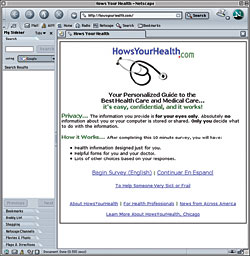Helping doctors ask their patients "How's your health?"
How well do doctors know their patients? Not well enough, says John Wasson, M.D., DMS's Herman O. West Professor of Geriatrics. A typical office visit may last 10 minutes, but Wasson observes that within "about 30 seconds" the physician will probably interrupt the patient.
An elderly man coming in with a complaint of joint pain, for instance, might have a host of other problems affecting his health, such as emotional stress or limited social support, that the doctor will never hear about. Wasson believes it is essential for doctors and patients "to get on the same page" in order to improve health care.
Online: Based on 20 years of research, Wasson has developed an inexpensive, effective means of promoting communication between patients and health-care providers. It's been used around the country, including Mobile, Ala.; Long Beach, Calif.; and, most recently, Chicago. Called How's Your Health (HYH), Wasson's project is aimed at primary- care practices and their patients. Its key component is an online questionnaire, tailored to age and gender, that helps patients identify their individual health concerns, risk factors, and quality-of-life issues.
Topics range from symptoms to family history, from health habits to use of prescription medications. The survey also asks such questions as "Do you have enough money to buy the things you need to live every day, such as food, clothing, or housing?" and "During the past four weeks, was someone available to help you if you needed and wanted help?" Aside from entering their zip code and the name of their hospital or clinic, respondents are anonymous.
The survey takes about 10 minutes to complete, and those needing assistance or lacking Internet access can fill it out at a participating health center. After putting in their answers, patients receive a computer-generated "action form," which they can print out and take to their doctors. The form outlines health "assets" and "needs." Assets might include not smoking or getting screening tests, while needs might pinpoint family history or unhealthy habits.
Patients are also directed to Web sites where they can learn more about such issues as exercise, eating well, or making health decisions. With this information in hand, Wasson says, patients are equipped to take more responsibility for their own care, with regard to both prevention and treatment.
Complaint: In response to the common complaint that doctors have too little time to get to know their patients, Wasson's program helps participating clinics make the best use of staff. For example, a nurse's assistant can gather information about a patient's overall well-being and pass it along to the nurse or doctor who will see the patient at an office visit. In some cases—for a patient managing chronic pain, say—periodic phone calls from the nurse can keep the patient on track and cut down on the number of office visits.
For the cities taking part in HYH, the composite results of the patient surveys contribute to a big picture that would be hard to get otherwise. In Chicago— where a six-week initiative to get patients to participate was sponsored by the Chicago Medical Society, the Department of Public Health, and the Chamber of Commerce—it was expected that more than 10,000 people would fill out the survey.

|
|
The "How's Your Health" Web site includes a health-issues survey, feedback patients can share with their doctors, and links to health information. |
In a preliminary assessment of 4,600 Chicago respondents, Wasson found that among patients whose daily activities are limited by pain, only 49% say a clinician is aware of the problem. Wasson says the three most frequently mentioned concerns, in Chicago and elsewhere, are exercise and nutrition, cancer and heart disease, and making the health-care system work better.
The success of the program— with practices reporting patient satisfaction rates as high as 90%, up from lows of 30%—has even caught the attention of the U.S. military. HYH is now being used by the Army, Navy, and Air Force. The State of New Jersey is one of the newest locales to sign up. The Commonwealth Fund "is offering small matching funds to interested communities," says Wasson.
To take the survey, visit www.howsyourhealth.org.
Catherine Tudish
If you would like to offer any feedback about this article, we would welcome getting your comments at DartMed@Dartmouth.edu.
